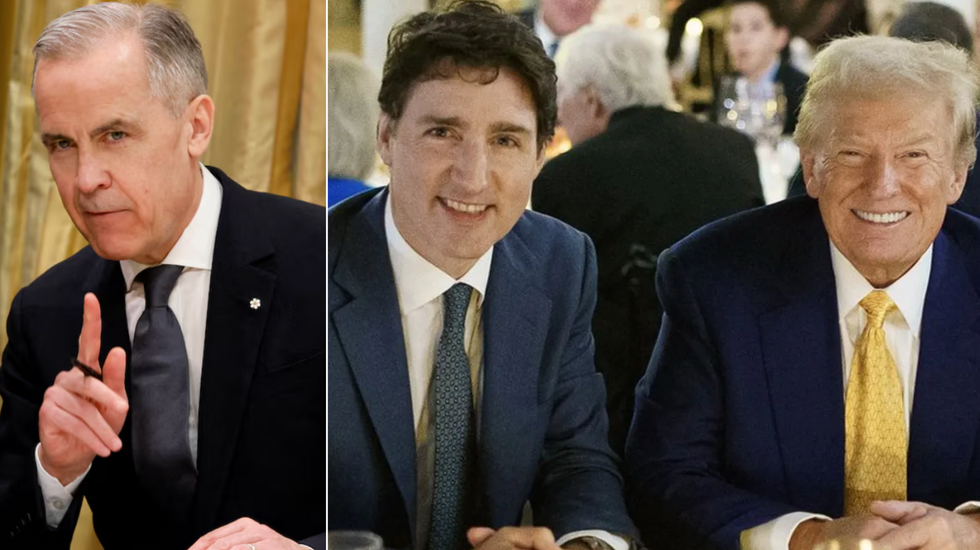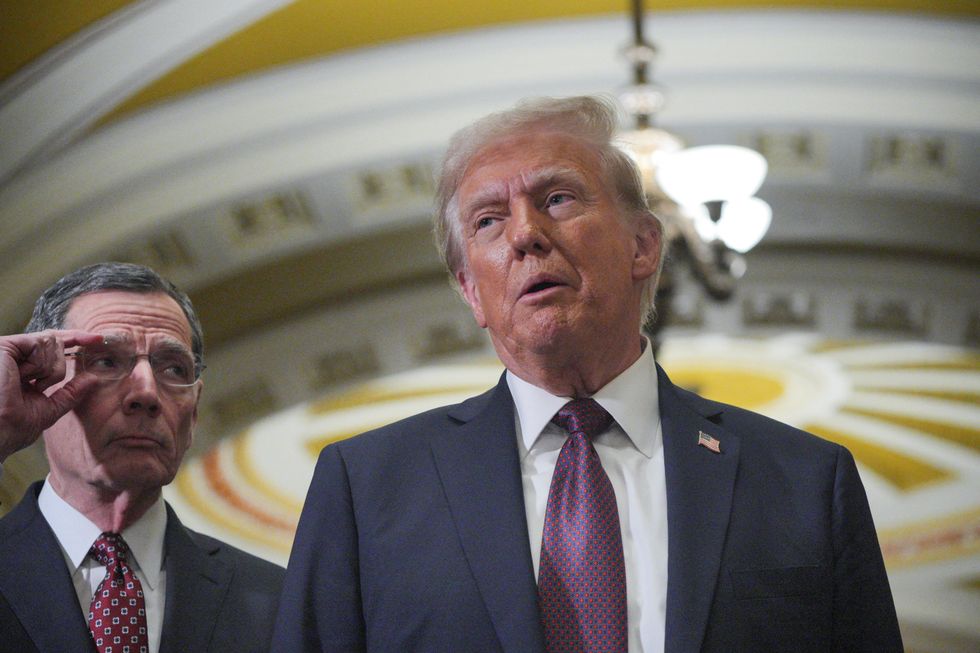REVEALED: How Mark Carney's odds-defying electoral win can be traced back to a single dinner in Mar-a-Lago
Donald Trump's provocative remark to then-Prime Minister Justin Trudeau was initially interpreted as a joke, sources claim
Don't Miss
Most Read
Trending on GB News
“America wants our land, our resources, our water, our country. Never!" Mark Carney told an enthusiastic crowd in Ottawa early on Tuesday.
His defiant victory speech capped off a stunning reversal of fortunes for the Liberal Party, which was languishing in the polls at the start of 2025 under Justin Trudeau's increasingly unpopular premiership.
It was also a rejoinder to the chaotic threat made by Donald Trump.
The 47th President's flirtation with the idea of annexing America's closest trading partner gave the Liberals an insurmountable lead over the Conservatives, who bore the brunt of anti-Trump sentiment in Canada's election.
But when did he first float it? The genesis of Trump's controversial idea can be traced back to November 29 last year.

Mark Carney's odds-defying electoral win can be traced back to a single dinner in Mar-a-Lago
Reuters/Justin Trudeau/X
On that now-fateful Friday, then-Prime Minister Justin Trudeau flew to Mar-a-Lago unannounced after Trump threatened to impose sweeping tariffs on Canadian products.
The ensuing exchange over dinner would later emerge in an article on Fox News.
According to a paraphrased account from two people at the table who heard the discussion, Trump told Trudeau if Canada cannot fix the border issues and trade deficit, he will levy a 25 per cent tariff rate on all Canadian goods on day one when he returns to office.
Trudeau told Trump he cannot levy the tariff because it would kill the Canadian economy completely. Trump retorted, asking: So your country can't survive unless it's ripping off the U.S. to the tune of $100billion?
The 47th President then suggested to Trudeau that Canada become the 51st state, which caused the prime minister and others to laugh nervously, sources told Fox News.
But he continued, telling Trudeau that prime minister is a better title, though he could still be governor of the 51st state.
On the same day Fox reported on the dinner comment, Trump posted on Truth Social, sharing an AI-generated image of himself beside a Canadian flag with the caption “Oh Canada!”
A week later, Trump referred to Justin Trudeau as "Governor Justin Trudeau of the Great State of Canada" on his social media platform.
On December 18, he posted the following on Truth Social: “Many Canadians want Canada to become the 51st State. They would save massively on taxes and military protection. I think it is a great idea. 51st State!!!”
On January 15, Trump floated the idea once again at a campaign rally in Ohio, telling a jeering crowd: "You know, our friends up north—they love us, maybe we should just make it official. Canada as the 51st state. Sounds good, doesn’t it?"
This allusion to annexation grew teeth on February 1, when Trump signed an executive order imposing a 25 per cent tariff on most Canadian imports, with a 10 per cent tariff on energy products.
In an accompanying press conference, Trump said: "If they want the benefits, maybe they should consider becoming part of the family."

Trump's repeated annexation call had a profound impact on Canada's election, polling suggests
ReutersOn March 28, Carney confirmed that Trump brought up the idea of Canada becoming the 51st state during the call.
"The president brings this up all the time. He brought it up yesterday. He brought it up before," Carney said at a campaign press conference.
Pressed by reporters, he added: "I said that he did. He has these things in his mind. This is not news."
This repeated call had a profound impact on Canada's election, polling suggests.
In January, Abacus Data conducted a national survey of 1,500 Canadian adults to understand public reactions to recent Trump's comments.
The polling found:
In a Leger poll conducted the following month, only nine per cent supported Canada becoming the 51st state, with 85 per cent opposing it.
In a taste of what was to come, only 18 per cent of Conservative supporters favoured annexation while 97 per cent of Liberal and NDP supporters opposed it.
That same month, Pollara’s Trump tracker found only 10 per cent of Canadian's felt Trump was joking about making Canada the 51st state, versus 34 per cent who believe he’s serious and 47 per cent who believe he’s doing it to threaten Canada as a negotiation tactic.
Faced with threats of annexation and tariffs, Canadians were turning on Trump, with 68 per cent holding negative views compared with 22 per cent having a favourable impression.
Revealingly, 51 per cent reported feeling angry toward Trump.
This ill-will curdled towards the election, with Pierre Poilievre, leader of the Conservative Party, blowing a historic 24-point polling lead to the Liberals as voters directed their ire towards Trump's equivalent.
On the night of the election, the American president repeated his “51st state” threat on social media, sealing the Conservatives fate.
“Elect the man who has the strength and wisdom to cut your taxes in half, increase your military power, for free, to the highest level in the World, have your Car, Steel, Aluminum, Lumber, Energy, and all other businesses, QUADRUPLE in size, WITH ZERO TARIFFS OR TAXES, if Canada becomes the cherished 51st. State of the United States of America,” he posted on Truth Social.








